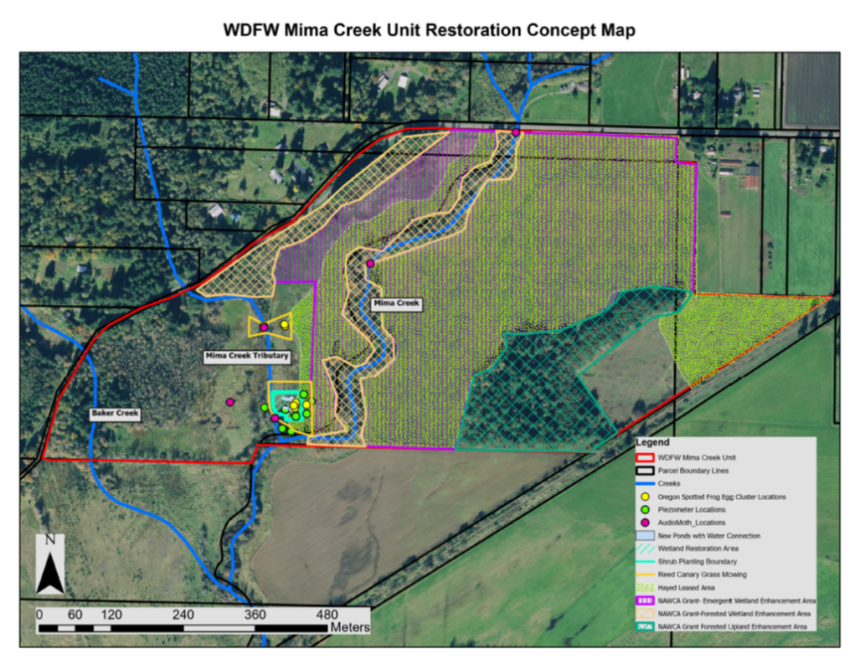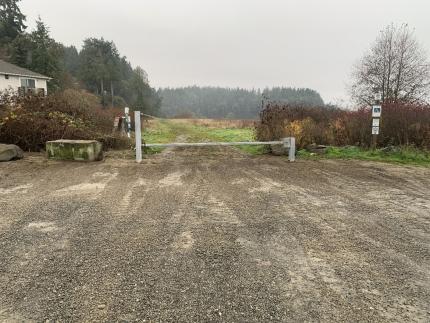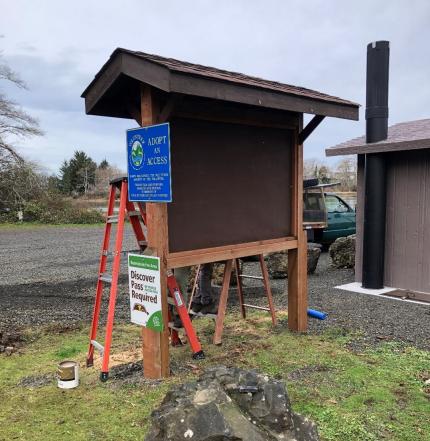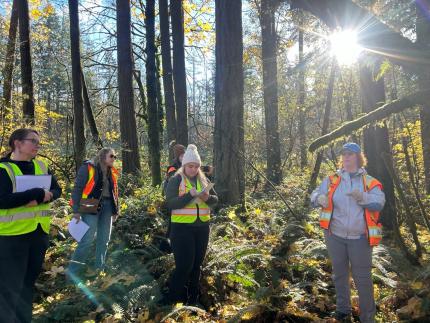Managing Wildlife Populations
Streaked Horned Lark Working Group: Biologists Tirhi and Butler represented Region 6 at the annual working group meeting hosted by the Portland Airport. The agenda included presentations on research results including habitat enhancement and lark reintroduction, updates to the federal listings and federal recovery plans, updates from both Oregon and Washington wildlife departments regarding ongoing and planned lark work, an overview of the survey results from Oregon and Washington 2022-2023 (including on airfields), data management needs, and more.
Washington Department of Fish and Wildlife thanks Portland Airport for being such an excellent host and partner on lark recovery.
Mima Creek Unit, Oregon Spotted Frog and Waterfowl Grant Funding: In November, Biologist Tirhi gave a grant request presentation to the Aquatic Species Restoration Plan (ASRP) Regional Implementation Team review board. The grant presentation was for Phase 2 of the Mima Creek Unit of the Scatter Creek Wildlife Area Oregon spotted frog/fisheries project. Phase 2 requests $122,427 towards design completion, permitting, and cultural review for the construction of two ponds, hydrologic connector to deep water Mima Creek tributary, manual gate pond water control installation, and the installation of several beaver dam analogs into Mima Creek. After receiving a unanimous thumbs up by the review board, Tirhi completed and submitted the next step of the grant request.
Biologists Tirhi and Novak met with Ducks Unlimited staff members to discuss the early stages of project implementation after being notified that the $1.3M Washington State Department of Fish and Wildlife and Ducks Unlimited (DU) North American Wetland Conservation Act (NAWCA) grant was awarded. Mima Creek will receive $310,000 from the NAWCA grant to enhanced wetlands for waterfowl and other species.

Western Pond Turtle: Biologists Butler and Tirhi represented Region 6 at the annual internal pond turtle planning meeting which was also attended by Region 5 and headquarters staff members. This is the annual opportunity for those Washington State Department of Fish and Wildlife biologists responsible for management of the eight pond turtle recovery sites to discuss and plan the past and upcoming turtle seasons and turtle recovery. The team presented their 2023 survey results and data collection including radio tagged breeding females and nesting results. They also discussed and planned research needs including disease response (USD), husbandry, and grant opportunities. This annual internal meeting is always followed at a future date with the larger partnership that includes Woodland Park Zoo, Oregon Zoo, PAWS, Sustainability in Prisons Project, and others.
Barred Owl and Common Loon: Biologist Tirhi represented District 11 by attending the internal discussion on barred owl removal project Barred Owl Management | U.S. Fish & Wildlife Service (fws.gov) and the internal planning discussion for common loon surveys and needs.
Providing Recreation Opportunities
Chimacum Unit Gate: Capital Asset Management Program (CAMP) staff members installed a gate at the Chimacum Unit in the North Olympic Wildlife Area to help allow emergency vehicles and vegetation maintenance equipment into the unit.

Johns River Kiosk Repair: Assistant Manager Gallegos, Technicians Magliaro and Martinez, and staff members at the Olympic-Willapa Hills Wildlife Area recently refurbished the kiosk at the Johns River Unit and water access area. Infrastructure such as wooden kiosks weather quickly in coastal areas and are often subject to deterioration of the lumber, moss and mold growth, loss of shingles, in addition to normal wear and tear.

Conserving Natural Landscapes
Interstate 5 (I-5) Connectivity Project: Biologist Tirhi represents Region 6 on the technical team for this project. She participated in the Connectivity Technical Team field trip to visit and discuss the various I-5 crossing locations that have been proposed. The team saw wildlife camera data from cameras positioned at the proposed locations showing big wildlife (bears, cougar) and small wildlife (bobcat, coyote, birds) attempting to cross or interested in crossing the interstate. Tirhi was surprised by how close the wildlife got to I-5 before deciding not to cross.

Conducting Business Operations and Policy
Personnel Development Plan: Biologist Tirhi met with Biologist Butler to complete her annual evaluation and expectations review for 2023-2024. This was a time to review the excellent work Biologist Butler provides to the agency and highlight expected work for this next season. The wildlife of District 11 is better off due to the hard work of biologists like Biologist Butler.